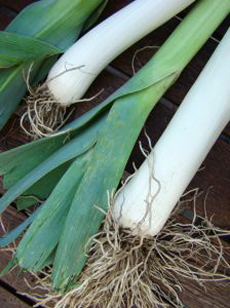|

Lovely leeks. Photo by Marlon Paul Bruin |
SXC.
|
|
On this past Sunday’s episode of Desperate Housewives, Susan Mayer had no idea what the long white vegetable that looked like a ginormous scallion was.
While it seems improbable that anyone who has ever strolled through a produce aisle can’t recognize a leek, it gave us this Tip Of The Day idea.
Leeks—a member of the onion species, allium—are in season now, and anyone who likes onions should cook some up.
To those Latin students who know that allium is garlic: garlic is also a member of the onion species, as are chives, shallots and ramps (wild leeks).
The edible portions of the leek are the white onion base and light green stalk. The bittersweet dark green portion at the end of the stalk is usually discarded.
Some recipes use only the white base. Save the light green portion for salads, stocks, quiche, burgers, general garnishes and so forth. Or batter and fry them as fried onion stalks, instead of onion rings.
|
|
Julia Child first introduced us to leeks in Mastering The Art Of French Cooking: leeks braised in butter (served with hot entrées, or served cold with cold meats and seafood), leeks browned with cheese and leeks in a ham quiche.
We later learned to love leeks as a soup ingredient. Scotland’s cock-a-leekie soup (chicken and leeks), leek and potato soup and vichyssoise—that delightful cold summer soup made of potatoes and leeks—are the most famous leek soups. Leeks are also the main ingredient in three-onion soup, along with onions and shallots.
Here’s a variation on that soup—a recipe for two-onion soup, made with leeks and sweet onions, also in season. Turn it into three-onion soup by adding a couple of minced shallots or garnishing it with chopped chives.
See the many types of soup in our Soup Glossary.
One last note: Leeks grow in sandy soil. Rinse them several times and look for sand.
|





